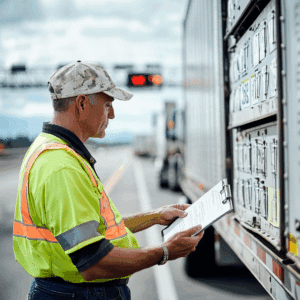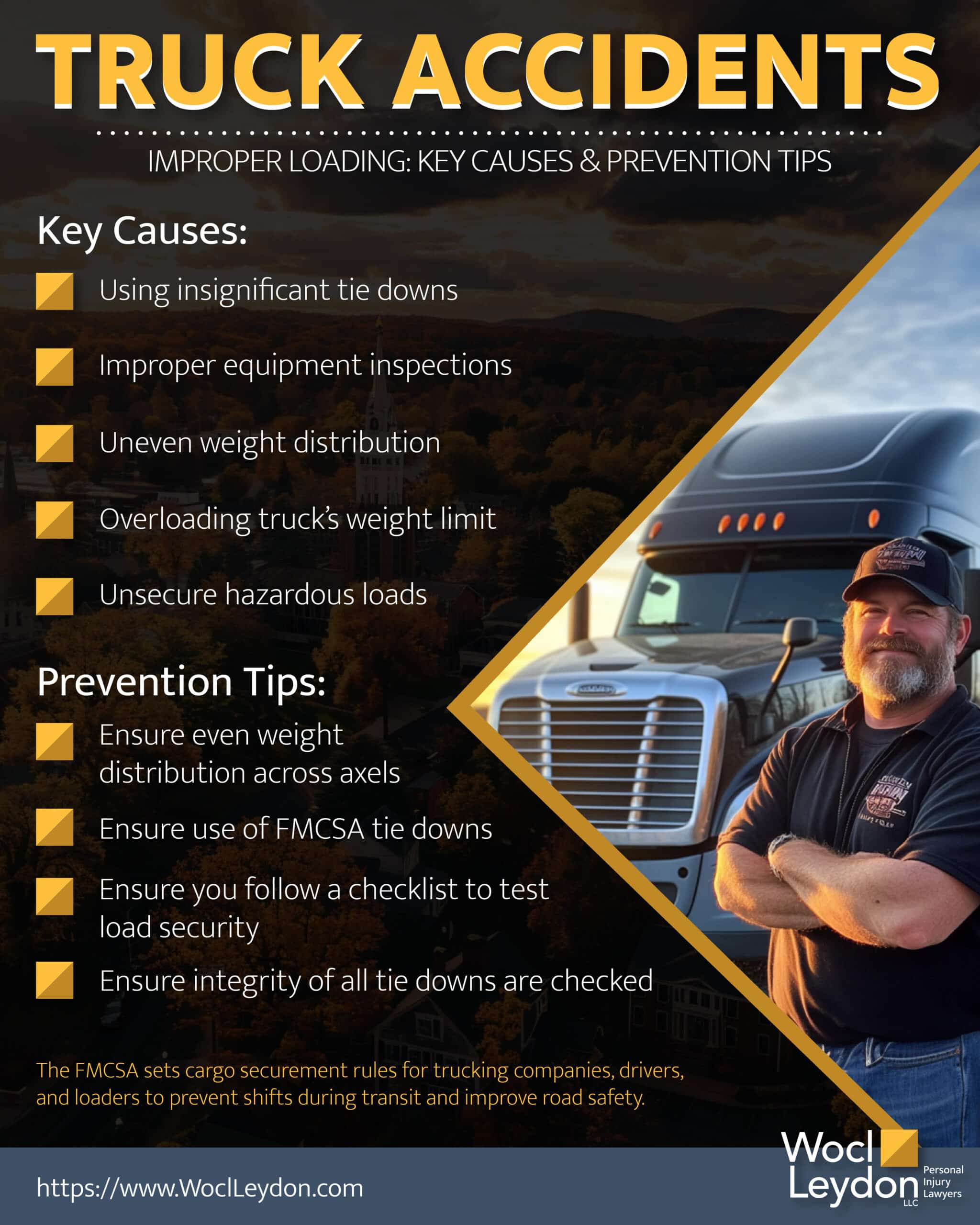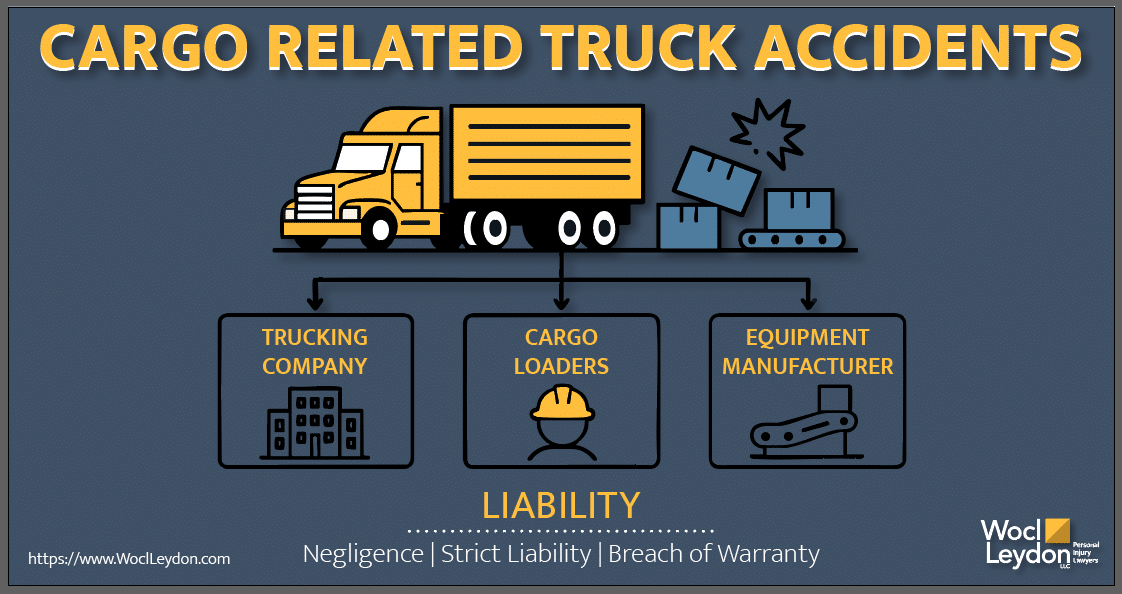Truck Accidents Due to Improper Loading: Key Causes and Prevention Tips
Last updated Thursday, April 24th, 2025

Truck accidents due to improper loading occur when cargo shifts, falls off, or destabilizes the truck. This results in serious accidents and injuries. Understanding why these accidents happen and how to prevent them is crucial. This article discusses key causes, legal responsibilities, and prevention tips to mitigate these risks.
Key Takeaways
- Improperly loaded cargo poses significant risks on highways, leading to accidents, injuries, and fatalities due to instability and unsecured loads.
- Common cargo loading errors include uneven weight distribution, insufficient tie-downs, and overloading, all of which heighten the risk of accidents.
- Legal responsibilities for cargo loading are shared among truck drivers, companies, loaders, and shippers, with strict federal regulations in place to ensure road safety.

Get Your FREE Case Review,
In Person or Virtually Online
The Dangers of Improper Cargo Loading
Improperly loaded cargo is a ticking time bomb on our highways. The sheer weight and volume of cargo carried by commercial trucks mean that any imbalance or unsecured load can lead to devastating consequences. Truck accidents caused by improper loading can result in serious injuries or even fatalities for both truck drivers and other motorists. The instability from such loading can cause rollovers or jackknifing, turning these commercial giants into uncontrollable hazards on the road. Improper cargo loading contributed to these dangerous situations.
Moreover, cargo that is not secured properly can detach from the truck, creating immediate dangers for other vehicles. Imagine driving behind a truck when suddenly, large cargo spills onto the roadway – it’s a nightmare scenario that can lead to multi-vehicle accidents and significant property damage. The risk of cargo shifts during transit further exacerbates these dangers, making it imperative to ensure that cargo is loaded and secured correctly.
The consequences of improper cargo loading are not just limited to immediate accidents. Falling cargo can cause other vehicles to swerve, leading to secondary accidents. The importance of proper cargo loading cannot be overstated, as it directly impacts the safety of everyone on the road. Properly loaded trucks maintain stability and prevent such dangerous accidents from occurring.
Common Types of Improper Cargo Loading Errors
While the dangers of improperly loaded cargo are clear, understanding the specific errors that contribute to these risks is crucial. One common mistake is uneven weight distribution, which can make trucks unstable and prone to tipping over. Using insufficient tie-downs is another major error, as it allows cargo to shift during transit, increasing the risk of accidents, especially when dealing with defective tie-downs.
Overloading is a significant issue where the total cargo weight exceeds the truck’s specified limit, putting undue strain on the vehicle. Overloaded trucks may struggle to stop effectively, thereby heightening the chances of rear-end collisions. Such errors in cargo loading not only risk the safety of the truck driver but also endanger other motorists on the road.
Unsecured loads are particularly hazardous as they can shift or fall off the truck during transit. This not only poses a direct threat to other vehicles but also creates obstacles on the road that can lead to dangerous accidents. Ensuring proper loading procedures and avoiding improperly secured practices is essential to mitigate these risks and prevent accidents caused by cargo shifts.
Legal Responsibilities in Cargo Loading

Trucking companies also have significant responsibilities. They must provide adequate training on safe cargo handling and securement practices, maintain vehicles, use appropriate security equipment, and avoid overloading.
A trucking company that fails to comply with these responsibilities can lead to severe legal consequences, including liability for accidents caused by improperly loaded cargo.
Cargo loaders and shippers are not exempt from these responsibilities.
They can be held accountable for negligence if they fail to load cargo properly or use inadequate restraints. Ensuring that all parties involved in the cargo loading process, including freight handlers, adhere to proper protocols is vital for preventing accidents and ensuring road safety.

Get Your FREE Case Review,
In Person or Virtually Online
Federal Regulations on Cargo Securement
Federal regulations play a crucial role in ensuring the safe transport of cargo. The Federal Motor Carrier Safety Administration (FMCSA) establishes comprehensive cargo securement rules that trucking companies, drivers, and loaders must follow. These regulations are designed to minimize the risk of cargo shifts during transit, thereby enhancing overall road safety.
FMCSA mandates that all secure cargo must be secured using appropriate restraints, such as straps and ropes, which should be tight and in good condition. This prevents cargo from moving or falling during transport. The use of worn or damaged securement equipment is strictly prohibited, as it can lead to failures and increase the risk of accidents.
Recent changes in federal cargo securement regulations can significantly impact liability assessments in truck accident cases. Strict adherence to these standards is essential for ensuring the safety of all road users. These regulations emphasize the need for safe loading practices and proper equipment maintenance to prevent serious accidents from occurring.
Identifying Signs of Improperly Loaded Cargo
Recognizing signs of improperly loaded cargo is crucial for truck drivers to maintain safety on the road. Drivers must conduct thorough pre-trip inspections to ensure that cargo is loaded properly and secured correctly. This involves checking that the cargo is balanced with heavier items at the bottom and lighter ones on top to maintain stability during loading cargo.
During transit, drivers should be vigilant for any signs of shifting cargo, such a way as the truck leaning to one side or visible signs of stress on the tractor-trailer. Identifying these issues early can prevent accidents and ensure that the cargo is properly secured throughout the journey.
Consequences of Shifting Cargo
The consequences of shifting cargo can be dire. A significant number of truck accidents are attributed to cargo shifts, with a reported relative risk of 56.3%. Such shifts can lead to rollovers, extended stopping distances, and the risk of cargo falling onto the road, all of which pose severe hazards to other motorists. The leading cause of these incidents is often related to improper loading and securing of cargo, making cargo shift a critical issue to address, particularly in the context of cargo-related accidents.
An unbalanced load can cause the truck to lean to one side, making it unstable and prone to veering out of its lane or even falling off elevated structures. Trucks with inconsistent speed or difficulty maintaining control may be experiencing issues due to improper weight distribution.
Overloading a truck can cause visible tire compression and suspension sagging, increasing the risk of accidents. Signs of stress, such as bulging or damage to the trailer, indicate improper loading that can result in structural failure. Ensuring proper cargo loading procedures can prevent these devastating consequences and enhance road safety.
Investigating Truck Accidents Due to Improper Loading
Investigating truck accidents caused by improper loading is a meticulous process that involves gathering substantial evidence. Documentation such as accident reports and cargo loading records plays a significant role in establishing liability. Collecting evidence at the scene, including photographs and witness contacts, is crucial for building a strong case.
Accident reconstruction experts often collaborate in these investigations to determine how improper loading contributed to the incident. Proving negligence in truck accidents frequently hinges on demonstrating that cargo loading standards were not followed in a cargo-related truck accident.
A thorough investigation is essential to ensure that all responsible parties are held accountable.
Potential Liabilities and Defendants
In cargo-related truck accidents, multiple parties can be held liable. Trucking companies, cargo loaders, and equipment manufacturers can all face legal consequences depending on the specific circumstances of the accident. Liability can be based on negligence, strict liability, or breach of warranty.
Cargo loaders can be held accountable for negligent practices, such as using inadequate restraints. Shippers can also be liable if they overload a vehicle or use defective loading equipment. Manufacturers of securing devices may face liability if faulty equipment contributes to an accident.
Victims can seek compensation under product liability laws for damages caused by defective equipment.
Compensation for Victims of Cargo-Related Truck Accidents
Victims of truck accidents caused by improperly loaded cargo have the right to seek compensation for their losses. This includes medical bills, lost wages, property damage, and pain and suffering. Documentation of all economic and non-economic losses is essential to support compensation claims.
Immediate medical attention is crucial to ensure health and document injuries sustained for legal purposes. Successful legal representation in truck accident cases can lead to significant financial recoveries due to the severity of injuries involved. The compensation a victim may receive depends on the severity of the accident that occurred and the extent of their injuries and economic losses.
Strengthening Your Legal Case
Strengthening a legal case involves meticulous evidence gathering, including medical records and police reports. The total maximum compensation amount can be significantly influenced by the severity of injuries and the evidence presented. Victims can pursue compensation for both financial losses and personal suffering caused by truck accidents.
Economic damages cover quantifiable losses like medical expenses and lost income, while non-economic damages address emotional distress and the psychological effects, such as physical pain and suffering. In cases of severe negligence, punitive damages may be awarded to deter future misconduct.
Expert testimony can greatly enhance the case and significantly strengthen the evidence of improper cargo loading practices.

Get Your FREE Case Review,
In Person or Virtually Online
The Role of a Truck Accident Lawyer
The role of a truck accident lawyer is indispensable for victims navigating the aftermath of truck accidents caused by improperly loaded cargo. Wocl Leydon specializes in truck accidents and has a team of truck accident lawyers to investigate the details of the crash and establish liability. Legal representation experienced in cargo loading cases is essential to uncover all potential liable parties.
Wocl Leydon provides comprehensive support, including handling insurance claims and negotiating settlements with the insurance company. Consulting Wocl Leydon helps navigate legal complexities and negotiate with insurers.
Contact Us for Expert Legal Support
If you are injured in a truck accident caused by improper cargo loading, it is crucial to call Wocl Leydon. With decades of experience and a proven track record of success, Wocl Leydon offers the expertise needed to handle these complex cases. Free consultations are available, allowing potential clients to assess their case without financial commitment.
Contact us today for a free case review and let us help you navigate the legal process to secure fair compensation for your injuries and losses.
Frequently Asked Questions
Can you sue a trucking company for negligence?
Yes, you can sue a trucking company for negligence if they create unsafe working conditions that lead to an accident, such as pressuring drivers to skip rest breaks. The company can be held liable for the resulting harm.
What are the common dangers of improperly loaded cargo?
Improperly loaded cargo creates significant risks, such as truck instability, rollovers, and potential cargo detachment, endangering both drivers and other road users. Ensuring proper load distribution is crucial for safety on the road.
What legal responsibilities do truck drivers have regarding cargo loading?
Truck drivers must inspect cargo securement before departure, at 50 miles, at the beginning of each driving period, and every 3 hours or 150 miles during transit to ensure safety and compliance. This responsibility is crucial for preventing accidents and ensuring the integrity of the load.
How can federal regulations impact liability in truck accident cases?
Federal regulations, particularly those set by the FMCSA regarding cargo securement, play a vital role in determining liability in truck accident cases. Non-compliance can lead to increased liability for the trucking company if an accident occurs.
Who can be held liable for cargo-related truck accidents?
Liability for cargo-related truck accidents can fall on several parties, including trucking companies, cargo loaders, and equipment manufacturers, depending on the details of the incident. It’s crucial to evaluate each party’s role to determine responsibility.



